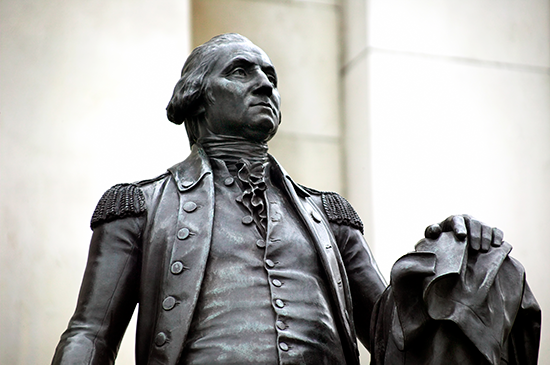
October-November 2020
Around the Corner
------------------
|





When Even Our Heroes Are Flawed
By Jesse Owens
Few things are more discouraging than learning one of your heroes had significant flaws, erred theologically, or committed grievous sin. Even when your heroes are historical figures, such a discovery can leave you feeling disoriented and potentially unsure about the otherwise valuable contributions that person made. “If my heroes did this or thought that,” we might ask, “then does it discredit all of the other things I love about them?” That is a question worth grappling with.
In the United States, many are reevaluating the record of some of our nation’s heroes, particularly on their views related to race and the treatment of minorities. We’ve seen video after video of rioters toppling or defacing monuments and statues around the country, in many but not all cases because of those historical figures’ racist views or actions. Certainly, America has a sad history of mistreatment of minorities. For many, the killing of George Floyd exemplifies this. The frustration is palpable.
One question I’m not sure we’ve equipped ourselves to answer in this moment of great tension is whether any historical figure can fully meet the modern ethical standard we’ve set. Do we have too idealistic expectations for national heroes or even Christian heroes? Have we set a standard of perfection none of us would be able to meet? Or have we come to a place when the standard is set, and our heroes are examined, no monument will be left standing and no new monuments erected in their place? These are questions we as a nation, and particularly we as Christians, need to consider. This article will focus on a Christian approach to our heroes in the faith.
“We’re Not Setting the Bar That High.”
Our culture and its values change with lightning speed. Just earlier this year, Democratic presidential candidates were throwing President Obama under the bus for being behind the times on key issues during his administration. These criticisms were intended to impugn the character of Joe Biden, who served as President Obama’s Vice President. The same thing happened during President Trump’s campaign when he scorned Republican leaders such as George W. Bush and John McCain. The culture moves quickly and leaves even recently lauded figures in its wake.
Some might object that the bar hasn’t really been set that high: don’t be a misogynist; don’t be a racist; don’t be xenophobic (many might add: don’t be homophobic or transphobic). These examples might seem like rather simple criteria to the broader culture in 2020. Yet, it’s easy to see that those who think these are simple criteria haven’t studied history closely. Few historical figures (at least those who left behind much writing) meet modern standards on these issues. [1]
Flawed (and Sinful) Heroes
I want to focus primarily on those we as Christians might lionize. In an essay several years ago entitled “There Is No Golden Age,” I tried to remind readers no previous generation or era is without significant flaws and grievous sin. That’s due to the fact that human beings, sinners by nature, inhabit every time period, which precludes the possibility of any truly golden age. Mark Noll captures this insight when considering the study of church history: “The golden ages of the past usually turn out to be tarnished if they are examined closely enough. Crowding around the heroes of the faith are a lot of villains, and some of them look an awful lot like the heroes.” [2] But even many of the heroes of the faith are flawed. We must reckon with this point.
One of my favorite history professors, John Carter, used to say we must fully consider the past—warts and all. Plenty of warts emerge, even in Christian history. I remember the first time I learned that Jonathan Edwards owned slaves; I wasn’t completely surprised, considering the age in which he lived, but I was nonetheless disheartened. I am an alumnus and current student at Southern Seminary, whose founders defended slavery and owned slaves. Christians have obviously sinned grievously on matters related to race and slavery.
But our sins don’t just pertain to race. We could even include things such as theological error. The great Baptist historian Tom Nettles once wrote: “We enter it [historical-theological dialogue] respectfully but with frankness. Where we can detect missteps, we seek to point them out and help provide corrective; where we see change that is more clearly in a biblical direction, we admire with joy the providence of God and the clarity of Scripture; where we see decline, we look for reformers.” [3]
Even when I read some of my favorite English General Baptist theologians, I find myself grimacing at times, wishing they would have said something differently or nothing at all! The same could be said of many of the reformers and other well-known Protestants over the past 500 years.
We could also consider the lives of some admirable 18th and 19th century missionaries. For example, Adoniram Judson was dedicated to taking the gospel to the people of Burma. He bravely traveled to Burma with his wife Ann in 1812. Ann died, and Judson later married Sarah Boardman.
Sadly, Judson’s second wife, Sarah, died due to illness during their voyage to America in 1845. Three of the Judson’s children were on the voyage with them. With his newfound circumstances, Judson was unsure that he’d be able to adequately care for his children in Burma. He felt that he had no choice but to leave his children with family and friends in America. We could view his action as a noble sacrifice, but many might view it instead as neglecting his responsibilities as a father. Even our heroes are not perfect.
Assessing Our Heroes and Their Work
Christians must be able to do two important things at the same time: condemn the sin and theological errors of those they admire, while also acknowledging the valuable contributions those individuals made. We cannot be satisfied with simply doing one or the other. We must deal honestly with the sins and shortcomings of our heroes in the faith. We cannot act as if Edwards and the founders of Southern Seminary weren’t wrong on the issue of slavery. They were. It will do us no good to deny their sins and shortcomings. But we also shouldn’t just reject their theological writings altogether. We must be able to see the valuable contributions they made, by the grace of God, while also reckoning with their sin. [4]
I often think of assessing the works of Christian heroes in terms of the great hymns of the faith. There’s reason to be concerned with Isaac Watts’s views on the doctrine of the Trinity, which seem suspect in some of his writings. But surely, we wouldn’t advocate for not singing great hymns such as “When I Survey the Wondrous Cross” or “Alas, and Did My Savior Bleed?” Horatio Spafford, who penned “It Is Well with My Soul,” later veered from biblical doctrine, but it is difficult to imagine we’ll stop singing his marvelous hymn. We won’t stop singing these hymns because truth is God’s truth. And, even when people stray from the truth or are guilty of great sin, the truth in their songs remains.
Psalm 106 details the many sins and failures of God’s people. They forgot God while they were enslaved in Egypt. They worshiped idols in the wilderness. They sacrificed their children to the idols of the Canaanites. Consequently, they were oppressed by the nations. But the psalm begins and ends with praise to God for His faithful covenant love toward His unfaithful covenant people. The sins of His people are not concealed; rather, they are recorded for our benefit as they highlight the love and mercy of God. We could say the same for the Patriarchs, David, Paul, and many others. These are far from perfect people.
I will not attempt here to speak for the broader American culture and the toppling and defacing of monuments. I am not without opinion on that subject. But I want to speak more directly to fellow believers. Christians must reckon with the fact that even our heroes are fraught with grievous sin—as are we. We should not dismiss their sin or their contributions to Christ’s Church. We should not demand perfection from historical figures any more than we demand it from ourselves. I suppose our deep disappointment with our heroes and their shortcomings is intended to lead us to long for One who is truly without flaw, failure, or sin.
About the Writer: Jesse F. Owens, his wife Tiffany, and their sons Gavin and Carter live in Gallatin, Tennessee, where Jesse serves as pastor of Immanuel Church and adjunct faculty member at Welch College. Jesse is also a Ph.D. candidate in historical theology at the Southern Baptist Theological Seminary. Read more from Jesse: TheHSF.com.
_______________
1 Consider Frederick Douglass, an American icon who advocated for the equality of black Americans. In his Pulitzer Prize-winning biography of Douglass, historian David Blight details Douglass’s seemingly racist critique of natives: “Blacks had achieved the ‘character of a civilized man,’ and Indians had not. The Indian, said Douglass by one invidious distinction after another, is ‘too stiff to bend’ and ‘looks upon your cities . . . your steamboats, and your canals and railways and electric wires, and he regards them with aversion.’ The Indian ‘retreats,’ said Douglass, while the black man ‘rejoices in modernity.’” Douglass’s views wouldn’t have been noteworthy in his time, but Douglass employs arguments for the superiority of black Americans over natives with the intent of gaining equal treatment for black Americans. See David W. Blight, Frederick Douglass: Prophet of Freedom. New York: Simon and Schuster, 2018, 486.
2 Mark Noll, Turning Points: Decisive Moments in the History of Christianity (Grand Rapids, MI: Baker Academic Press, 2012), 9.
3 Thomas J. Nettles, “John Calvin’s Understanding of the Death of Christ,” in Whomever He Wills: A Surprising Display of Sovereign Mercy (Cape Coral, FL, Founder’s Press, 2012), 293.
4 We might also consider our posture when assessing historical figures. We should not act as if we live in the most enlightened age in human history, and therefore stand in judgment over the past. We must consider the past and our heroes in context and with utmost empathy. For we too are but mere mortals marred by sin and are oblivious to many of the blind spots of our own age. One day future generations will consider our shortcomings as well. We do well to take all of these things into account when considering the past.
|
|

